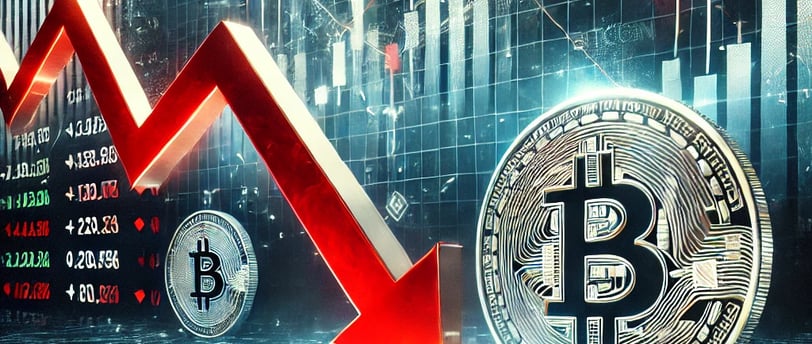Trump’s Tariff Threats Shake Markets: How Stocks and Bitcoin Are Reacting
Trump’s ongoing tariff threats have sent shockwaves through the stock market, causing uncertainty and sell-offs, while Bitcoin continues its sideways movement, waiting for a breakout. Investors are watching closely as global trade tensions and economic policies shape the future of both traditional and digital assets. Will this volatility present a buying opportunity, or is more turbulence ahead? Dive into our analysis of market reactions, expert insights, and what it all means for your investments.
GEOPOLITICS & GLOBAL RELATIONSTARIFFBITCOIN NEWSGLOBAL ECONOMY


Navigating Market Turbulence: Trump's Tariff Policies and Bitcoin's Market Dynamics
In the intricate world of global finance, policy decisions can send ripples across markets, influencing investor behavior and asset valuations. President Donald Trump's recent tariff policies have introduced a layer of uncertainty, leading to notable reactions in traditional stock markets. Simultaneously, Bitcoin, the flagship cryptocurrency, has exhibited a pattern of lateral movement, often referred to as "crab walking," as it awaits a decisive breakout. This article delves into the impact of these tariff threats on stock markets and provides an analysis of Bitcoin's current market behavior, incorporating insights from political figures and cryptocurrency experts.
Trump's Tariff Policies: Catalysts for Market Volatility
In early 2025, President Trump announced a series of tariffs targeting major U.S. trading partners, including Canada, Mexico, China, and the European Union. These measures encompassed a 25% tariff on imports from Canada and Mexico, with specific exceptions for Canadian crude oil and energy products, which were subjected to a 10% tariff. The administration justified these actions as efforts to reduce the U.S. trade deficit and address concerns related to illegal immigration and drug trafficking. en.wikipedia.org+1en.wikipedia.org+1en.wikipedia.org+1en.wikipedia.org+1
The immediate aftermath of these announcements was a pronounced decline in U.S. stock markets. The S&P 500 index experienced a 1.8% drop, while the Nasdaq-100 index fell by 2.6%. These movements reflect investor apprehension regarding potential disruptions to trade relationships and the broader economic implications of escalating trade tensions. en.wikipedia.org
Market Reactions and Economic Concerns
The implementation of these tariffs has raised several economic concerns:
Inflationary Pressures: The tariffs are anticipated to increase the prices of imported goods, contributing to higher consumer prices. This inflationary trend could prompt the Federal Reserve to consider interest rate hikes, further influencing borrowing costs and consumer spending. businessinsider.com
Corporate Profit Margins: Companies reliant on imported materials may face increased costs, potentially squeezing profit margins. This scenario could lead to reduced capital expenditures and a slowdown in business expansion plans.
Global Supply Chain Disruptions: The interconnected nature of global supply chains means that tariffs can have cascading effects, disrupting production processes and leading to inefficiencies across various industries.
Bitcoin's Market Behavior: The 'Crab Walk' Phenomenon
Amidst the volatility in traditional financial markets, Bitcoin has exhibited a pattern of sideways trading, colloquially termed as "crab walking." After reaching an all-time high of $109,135 in January 2025, Bitcoin's price has fluctuated within a relatively narrow range, struggling to break the $100,000 threshold. barrons.com
Factors Influencing Bitcoin's Price Movement
Several factors have contributed to Bitcoin's current market behavior:
Correlation with Traditional Markets: Despite being considered a hedge against traditional financial systems, Bitcoin has shown a degree of correlation with stock markets. The recent declines in major indices have coincided with Bitcoin's inability to sustain upward momentum.
Regulatory Developments: Governmental policies and regulatory announcements continue to play a significant role in shaping investor sentiment toward cryptocurrencies. Uncertainties in this domain can lead to cautious trading behavior.
Market Sentiment and Speculation: The cryptocurrency market is heavily influenced by investor sentiment. Periods of uncertainty or lack of clear direction can result in reduced trading volumes and price stagnation.
Insights from Political and Crypto Industry Leaders
To gain a deeper understanding of the current market dynamics, it's essential to consider perspectives from both political figures and leaders within the cryptocurrency community:
David Rosenberg, Market Strategist: Rosenberg emphasizes a cautious approach to investing amidst economic uncertainties, advising alignment with Warren Buffett's conservative strategies. He highlights concerns over economic conditions, trade tariffs, and reduced corporate capital spending, all contributing to potential recession risks. marketwatch.com
Maroš Šefčovič, European Commissioner for Trade and Economic Security: Šefčovič notes that the proposed U.S. tariffs could have a substantial impact on the European economy, potentially leading to a contraction of 0.4%. He emphasizes the need for ongoing dialogue to mitigate these adverse effects. en.wikipedia.org
Sarah Ledger, Bitcoin Analyst: Ledger observes that Bitcoin's current price action reflects a market in a "wait-and-see" mode. The looming economic uncertainties are causing investors to tread cautiously, leading to the sideways trading pattern observed in recent weeks.
Strategic Considerations for Investors
In light of the current economic landscape, investors may consider the following strategies:
Diversification: Allocating investments across various asset classes can help mitigate risks associated with any single market segment. This approach includes balancing exposure between traditional equities, fixed income, and alternative assets like cryptocurrencies.
Focus on Resilient Sectors: Investing in industries less susceptible to trade disruptions, such as healthcare and consumer staples, may provide more stable returns during periods of economic uncertainty. barrons.com
Monitoring Policy Developments: Staying informed about governmental policy changes and geopolitical events can aid in making timely investment decisions. Understanding the potential impacts of new tariffs or trade agreements is crucial for proactive portfolio management.
Conclusion: Navigating Uncertainty with Informed Strategies
The interplay between President Trump's tariff policies and Bitcoin's market behavior underscores the complexity of today's financial environment. Traditional markets are grappling with policy-induced volatility, while cryptocurrencies like Bitcoin navigate their own set of challenges amidst broader economic trends. For investors, maintaining a well-informed and adaptable approach is essential. By diversifying portfolios, focusing on resilient sectors, and staying abreast of policy developments, investors can better position themselves to navigate the uncertainties of the current market landscape.
*Disclaimer: This article is for informational purposes only and does not constitute financial advice. Investors should


